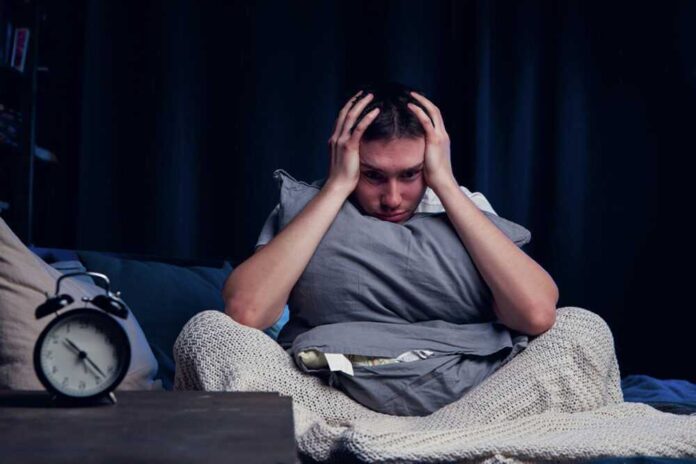Stress and anxiety have become practically universal in our fast-paced society. People are continuously navigating through circumstances that affect their mental health, from hard employment to personal obstacles. Insomnia is among the most important—yet frequently disregarded—effects of ongoing stress and worry. The inability to fall or stay asleep is the hallmark of this sleep disorder, which not only lowers quality of life but also feeds the vicious cycle of stress and worry. This article explores the complex relationship between stress, anxiety, and sleeplessness, providing insights into potential coping techniques and illuminating underlying mechanisms.
Comprehending Sleeplessness
A prevalent sleep ailment that impacts millions of individuals globally is insomnia. It can show itself in a number of ways, such as having trouble getting asleep, waking up a lot during the night, waking up too early and finding it difficult to fall back asleep, and waking up feeling exhausted. The effects of sleeplessness go beyond simple exhaustion. Chronic sleeplessness raises the chance of developing diseases like depression, anxiety disorders, and cardiovascular disease by causing mood swings, cognitive decline, and a decline in general physical health.
Sleep and the Stress Reaction
The body goes through a sequence of physiological reactions while under stress, which are commonly known as the “fight-or-flight” response. The brain’s hypothalamus sends signals to the adrenal glands to release stress hormones like cortisol and adrenaline when an individual is in a stressful environment. These hormones raise blood pressure, heart rate, and energy levels to prime the body to respond to whatever threat it may sense.
Chronic stress maintains the body in a condition of persistent high vigilance, even though this response is advantageous in short-term, acute stress situations. In particular, high cortisol levels can disrupt the circadian rhythm, which is the body’s normal sleep-wake cycle. Normally, cortisol levels decrease in the evening to get the body ready for sleep. On the other hand, prolonged stress keeps cortisol levels high, which makes it hard to unwind and go to sleep.
What Anxiety Does to Insomnia
Stress and anxiety are tightly related, which makes their relationship more difficult to manage. The persistent condition of mental hyperarousal has the potential to seriously interfere with sleep cycles.
Anxious people usually have racing thoughts and find it difficult to shut their minds off, which are two main sleep-inhibiting factors. Even when they do fall asleep, it’s usually not a good night’s sleep, with numerous awakenings and restless legs. People who experience fragmented sleep may experience less deep, restorative sleep, which can leave them feeling less refreshed and exacerbate their anxiety symptoms the following day.
The Feedback Loop: Stress, Anxiety, and Insomnia
Because the body and mind aren’t getting the rest they require to recuperate, insomniacs’ lack of sleep raises their stress and anxiety levels. This feeds back into the cycle, raising cortisol levels and making it harder to fall and remain asleep.
People with a reduced ability to control their emotions are more vulnerable to stressors and are more likely to feel anxious, which further interferes with their ability to sleep.
Essential Elements of CBT-I
Together, these essential elements of CBT-I enhance the quality of sleep. Among them are:
1. Sleep Education It’s important to comprehend the physiology of sleep as well as the variables that affect it. People learn about the sleep cycle, the value of good sleep hygiene, and how lifestyle decisions affect sleep during CBT-I. Having this fundamental understanding enables people to make well-informed judgments regarding their sleeping patterns.
2. Restructuring Cognitively
Negative ideas and attitudes about sleep that amplify worry and prolong the cycle of insomnia are frequently associated with insomnia. Cognitive restructuring aids people in recognizing and disputing these harmful ideas. For instance, the assumption that one must receive eight hours of sleep to perform efficiently can cause undue pressure. CBT-I develops a more flexible thinking, lowering anxiety and fostering better sleep.
3. Control of Stimulus
People with insomnia may come to equate sleeping in bed with awake. The goal of stimulus control strategies is to strengthen the connection between bed and sleep. This contains criteria such as going to bed only when sleepy, utilizing the bed solely for sleep and intimacy, and getting out of bed if unable to sleep within 20 minutes. People can end the cycle of insomnia by rewarding these actions.
4. Sleep Deprivation
Ironically, staying in bed too much can make insomnia worse. Mild sleep deprivation is produced via sleep restriction therapy, which restricts the length of time spent in bed to the amount of sleep a person actually gets. This enhances the drive to sleep, resulting to more consolidated and restful sleep over time. As sleep efficiency increases, bedtime is gradually extended.
5. Methods of Relaxation
Stress and worry are important contributors to sleeplessness. CBT-I combines relaxation techniques such as progressive muscle relaxation, deep breathing exercises, and mindfulness meditation. By calming the body and mind, these techniques facilitate falling and staying asleep
The following tactics may be useful:
Techniques for Stress Management: Deep breathing exercises, progressive muscle relaxation, and mindfulness meditation are a few stress-reduction techniques that can help relax the mind and get the body ready for sleep.
Insomnia Treatment with Cognitive Behavioral Therapy (CBT-I): A structured therapy called CBT-I assists people in recognizing and altering the ideas and actions that lead to sleeplessness.
Physical Activity: Studies have demonstrated that regular exercise lowers stress and anxiety levels, which in turn improves sleep. But since intense activity might be stimulating right before bed, it’s best to avoid it.
Expert Assistance: Getting assistance from a mental health expert can offer extra support and treatment alternatives, including counseling or medication, in situations where stress and worry are excessive.
In summary
The complex interplay among stress, anxiety, and insomnia emphasizes how crucial it is to treat mental health conditions in order to enhance the quality of sleep. By being aware of how these factors interact, people can break the cycle of sleeplessness by taking proactive measures to manage their stress and worry.

